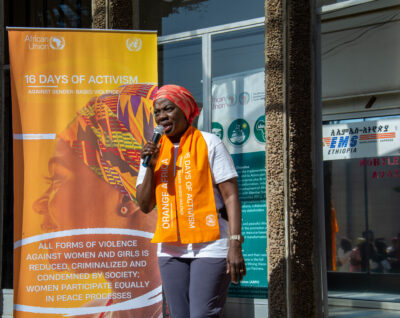A boy is threatened by a powerful henchman, and the father despairs his son may be killed. In the middle of the night, the father decides that the family must leave immediately, and they flee to the border. The father hopes a new country might provide just enough safety for his son to grow up, away from the instability and political violence that characterize the child’s home.
The holy family’s escape to Egypt illustrates how Jesus was a refugee, like hundreds of thousands of children around the world today. As importantly, Matthew’s author depicts an anxious father: God, the father, who sent a messenger to instruct Joseph and Mary to run away and seek safety for Jesus in another country. In this instance, God’s fatherhood of Jesus is akin to actions of fathers around the world who leave their homes believing that more security for their children is available elsewhere. God’s fatherhood shares with migrant fathers experiences of fear and uncertainty, and also hope that different social and political conditions might protect their loved ones from harm.
The flight into Egypt reminds contemporary Christians that there have always been alternatives to stale theological accounts of “father knows best.” Indeed, for ancient Christian Trinitarian theologians, to call God “The Father” was integral to a mischievous theological claim. If God the Father and God the Son were equally God, then a basic hierarchy—indeed patriarchy!—was upended. Trinitarian theology presented a sly critique of existing power relations, a way to say that God Godself modeled a different way of being in relationship, a counter-cultural vision in which fathers and sons were equal. For orthodox Christians to revere God the Father was also a way to critique a foundational social arrangement. (Thank you to Mary Julia Jett for talking with me about the Father and the Son.)
Christian theology has seemingly forgotten the Father’s ironic relationship with the Son, lost sight of the Father’s worry and concern for Jesus’s safety, and stalled in the metaphor of divine fatherhood. God the Father has become the dominant (and dominating) metaphor in Christian communities around the world, despite otherwise vast diversities of theologies and practices. I have experienced this in my own context: I grew up in the Eastern Orthodox Church, where, even against a strong current of apophatic theology (in Sunday School we practiced describing God by what God is not), God was primarily and predominantly Father. Now I attend a Quaker Meeting and I teach in an ecumenical, progressive (not yet post-) Christian seminary, yet I am frequently startled by how people depend on patriarchal language to describe divine energies.
To be clear, the fatherhood typically ascribed is a particular sort. This God as Father is a father with authority, autonomy, and control. He may in fact be a father who loves his son, and a father who loves all his children, but this father does so from a position of security, which he bestows on his beloved. Certainly, there are more diverse experiences of fatherhood than ones Christians now typically ascribe to God. Indeed, the Gospel of Matthew depicts such diversity! How can we cultivate a moral imagination more in touch with the depth and breadth of experiences, and so one more suited to developing new and more fitting names for God? (And yes, to be self-aware, I should dwell on the “we.” In this instance, “we” refers to the broader theological academy who teach and write.)
The prevailing imagination of God as Father does not suggest fatherhood as a condition of vulnerability, struggle, and potential loss. But if we assume a theological imperative to draw metaphors from “reality’s vastness,” to bring the world “more fully into view,” then to consider God as Father may invite comparisons with a father who travels thousands of miles, through Central America to our southern border, with his children so they might be safe and well. Subject to political and economic conditions shaped, in part, by US foreign and trade policies, this father is driven by steadfast love for his children and is anguished when the US government separates them from him or incarcerates them together. Fatherhood, in this case, refers to people who, even with great love, strength, and courage, are subject to violent structures of racism, colonialism, and neoliberalism.
Central American fathers remind us that fatherhood is a complex sociological category that describes a diversity of political practices. Fatherhood means guessing at the benefits of making a treacherous journey to seek political asylum, against the risks that your son will become a target of communal violence at home. Fatherhood means procuring a letter from your son’s school principal, affirming that your son is at grave risk if he stays at his school, if he stays in his home. Fatherhood means being driven forward by a deep love for your child and an abiding faith that you will manage to find people and institutions willing to offer him protection. As it did for Jesus’s father in the Gospel of Matthew, fatherhood in the midst of contemporary crises entails caring for children, undertaking systemic social analysis, devising political strategies, and demanding justice.
Considering Pan-American fatherhood demonstrates how the metaphor of father has relevance for our world today, as it stimulates new critiques of existing hierarchies and power relations. Indeed, to imagine divine fatherhood as, in part, characterized by struggle and vulnerability, continues the theological efforts of Matthew’s author and early Christian theologians who gave us accounts of God as father that were mischievous, sly, shocking, and true.













